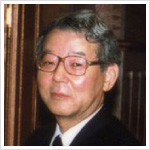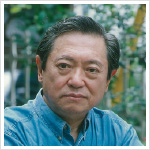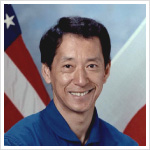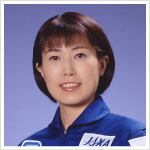The inspiration for the Space Poem Chain was the idea that space is not meant to be merely something for ballistic missiles or rocket-based weapons, but that we must open it up as a place that offers a wide range of possibilities for human beings and other living creatures. In other words, it was born from the conviction that we must not use space for military purposes alone, but that we should see it as a wilderness open to a broad range of peaceful uses. I look forward with pleasure to the participation of all people of feeling.
I came to understand the meaning of "let there be light" in the midst of the darkness of the universe. I came to understand the "origin of life" on the earth shining blue in the light of the sun. And I came to feel that what I needed was not scientific expression, but rather artistic expression, to be able to tell this to many people. I hope to share my experiences with many people on the Earth through the medium of the Space Poem Chain.
I am very honored to be able to participate in the Space Poem Chain. We, and everything that takes place in the world, are part of the universe. Therefore, space is not something faraway, but something that each of us is tied to. Through the Space Poem Chain, I hope that we can link together various thoughts of many people, and I look forward to delivering the results to space.

Haruo Saji
(President, Suzuka Junior College)
It was the English writer Oscar Wilde who said that "Nature imitates art." It seems paradoxical, but he seems to have been saying that human understanding of nature becomes possible through art which captures its essence and expresses it in a condensed way. Art is the very form of expression that allows us to directly influence the soul. If the Space Poem Chain, as a work of art, is able, thanks to the participation of ordinary citizens, to deepen humanityfs universal understanding of space, it will be a first step toward world peace.

Hiroo Inokuchi
(JAXA Advisor)
From long, long ago, many men and women of different ages composed tanka poems in their everyday lives, and enjoyed haiku. They skillfully grasped the changes in nature that made up the themes of the poetry, condensed them into short words, and expressed the thoughts that we all have. Today, as the Japanese Experiment Module is being prepared to go into operation within the International Space Station, the symbol of the space age, we hope to look at nature, which has become a step larger, in conjunction with the astronauts, and to open a new chain of relationships. This is precisely the first step that will allow humanity to become one, overcoming geographical, religious, and linguistic barriers.
The 21st century began with newspaper reports that an entire family had been murdered in Setagaya Ward, Tokyo, and this is symbolic of the problems that Japan is facing today. Following the birth of the universe 13.7 billion years ago, matter slowly came together to create the first "life" on the young Earth approximately 4 billion years ago, and through a number of steps, our own "life" came to be. Today, we do not live merely in a beautiful world; it is a place of struggle as well. I will be very happy if the Space Poem Chain can evoke the close bonds hidden in the harsh processes by which the transformation of life and matter take place.

Tetsuya Muroyama
(NHK Commentator)
Evolution involves a movement toward "diversity." The Earth is covered with an incredible diversity of living things. Human beings are divided into a number of ethnic groups, and through different cultures and civilizations, we have built our own spiritual worlds. What will happen as we are brought together by the idea of "space"? A multitude of myths will be woven together in a complex way, and while shining like precious stones will collide with one another, fuse together, and give birth to myths for the future. Either that, or suffering will increase, creating an enormous tragedy. When seen from across the universe, what do we human beings look like? In what color do we shine?
The Milky Way is becoming more and more difficult to see in the Japanese night sky, but even now the stars shine and send us messages of faint light. It is precisely because of the faintness that we must appreciate and take special care to receive them. Astronomers have made big celestial telescopes and use them to read these "letters" from outer space. Poets, with hearts honed fine, are trying to translate these messages into their own words. Both may be alike in their effort to hear the voices of the universe, wherever they come from. The Space Poem Chain has its background the portraits of celestial bodies taken by astronomers. The poems themselves are wonderful, but with the celestial portraits behind the effect is of poetry being declaimed in the realm of outer space, truly original and striking. Please join us in outer space!







